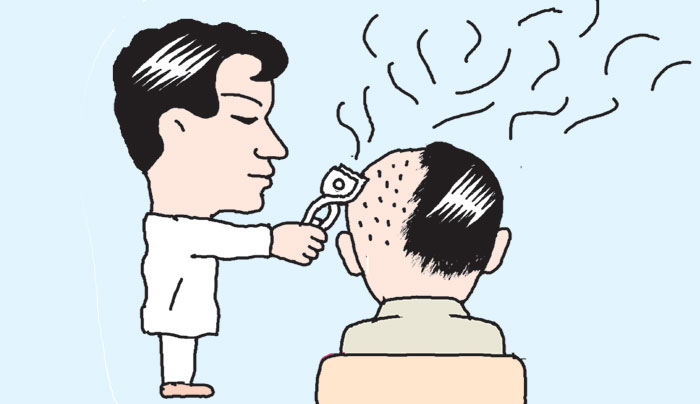'삭발을 하다'라는 영어 표현엔 두 가지가 있다. 일반적으로는 면도하듯이 머리털을 완전히 밀어버린다는(get one's hair entirely shaved off) 뜻에서 'shave one's head'라고 하거나 'have one's head shaved'라고 한다. 이에 비해 속세를 떠나(renounce the world) 스님이 되거나(become a Buddhist monk) 할 때 종교적 이유로 (on religious grounds) 삭발하는 것은 'take the tonsure'라고 한다.
부패 혐의에 연루된(be implicated in corruption allegations) 법무장관이 사임하거나 해임되기를 촉구하는(call for him to resign or be sacked) 야당 의원들의 삭발이 이어지면서 외신들도 한국의 독특한 '삭발 문화'에 새삼 관심을 보이고 있다.
항의 표시로서의 삭발은 유교 문화에 뿌리를 두고 있다(have its roots in the Confucian culture). 대의명분에 대한 헌신을 시위하는(demonstrate commitment to a cause) 항변이었다. 그랬던 것이 군사 독재(military dictatorship)를 거치며 관심을 끌기 위한 저항의 상징적 몸짓(symbolic gesture of resistance to draw wide attention)으로 이용되기 시작했다.
유교에선 특히 효도를 강조한다(emphasize filial piety). 부모로부터 물려받은(inherit from your parents) 신체발부 중 어느 하나라도 훼손하는 것은 용서받을 수 없는 불경(unforgivable disrespect)으로 여긴다. 그럼에도 감히 삭발을 한다는 것은 목숨을 걸 만한 사안에 대한 사생결단 결의를 시사하는(imply one's determination on a matter worth risking one's life) 행위다.
삭발은 반대를 위한 마지막 수단(last resort for the opposition)이지만, 과거엔 가식적인 정치인(pretentious politician)들이 쇼를 하는 데(put on a show) 악용되기도(be exploited) 했다. 얼마 후면 다시 자랄 머리카락 외엔 별다른 자기희생이나 고통의 인내를 요하지도(require any self-sacrifice or endurance of pain) 않아 단식투쟁(hunger strike)보다 더 애용됐다.
그러나 현재 시국은 제1 야당 대표(leader of the main opposition party)까지 나서서 삭발을 하는 초유의 사태(unprecedented situation)를 빚고 있다. 대통령과 집권당(ruling party)이 온갖 부조리를 무릅쓰고(despite all sorts of irregularities) 장관 임명을 밀어붙이자(push ahead with the ministerial appointment) 야당은 자신들의 목소리를 전하겠다며 극단적 행위를 하는(commit the extreme act in order to get their voices heard) 지경에 이르렀다.
성경에 나오는 삼손은 머리털을 잘려 힘을 잃었는데(lose his power) 한국에선 힘을 얻어보겠노라 자진해서 삭발을 해야 하는(cut their hair voluntarily to gain strength) 기구한 현실이 벌어지고 있다.
[영문 참고자료 사이트]
☞ https://www.bbc.com/news/world-asia-49723871
☞ https://en.wikipedia.org/wiki/Head_shaving
☞ http://www.koreaherald.com/view.php?ud=20190917000730
☞ http://www.koreatimes.co.kr/www/news/nation/2015/04/636_178079.html
